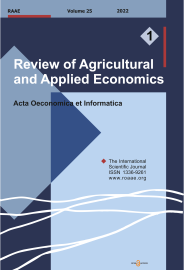KEYWORDS:
impact; improved variety; grain crop; household food security
DOI NUMBER:
10.15414/raae.2022.25.01.73-86
ABSTRACT:
Research Background: Access and consumption of adequate food are essential components of development goals. Agriculture is expected to play an important role in ensuring food security by increasing the availability of food at the household level. Ethiopia is attempting to enhance agricultural production and productivity to combat food insecurity.Purpose of the article: The purpose of this study was to assess the impact of adopting improved wheat varieties on food security in Girar Jarso Woreda, Oromia Region, Ethiopia.
Methods: First multistage sampling techniques were used to select a target sample of 192 households, 90 adopters, and 102 non-adopters. Three kebeles were selected at random from Girar Jarso Woreda based on wheat crop cultivation. Primary and secondary sources were used to acquire both qualitative and quantitative data. The data was gathered through a household survey, key informant interviews with sample farmers, focus group discussions, and a review of reports. The researchers utilized a logit model to identify factors influencing wheat variety adoption, and the Household Food Balance Model (HFBM) was utilized to calculate net available food at the household level. A Propensity Score Matching (PSM) technique is also employed to quantify the impact of improved wheat varieties on households' food security.
Findings, Value-added & Novelty: The findings demonstrated that education level, involvement in training, demonstration, and field day events, distance to market, access to market information, and farmer cooperative membership all had a substantial impact on the adoption of improved wheat varieties. Hidase, Digelu, Dandeha, and Kubsa were improved wheat varieties planted by adopters in the study region during the 2017/2018 crop year. Adopting improved wheat varieties has the potential to increase food availability at the household level, which is a good indicator of food security.
Please Cite this Article as:
Hiwot HAILU, Degefa TOLOSSA (2022) Impacts Of Adopting Improved Wheat Varieties On Household Food Security In Girar Jarso District, Ethiopia. Review of Agricultural and Applied Economics. XXV (Number 1, 2022): 73-86. doi: 10.15414/raae.2022.25.01.73-86
URL for sharing:
https://roaae.org/1336-9261/doi/abs/10.15414/raae.2022.25.01.73-86
FULL TEXT PDF:
▼ direct download link| view online in fullscreen ▲
References:
▼ direct download link

